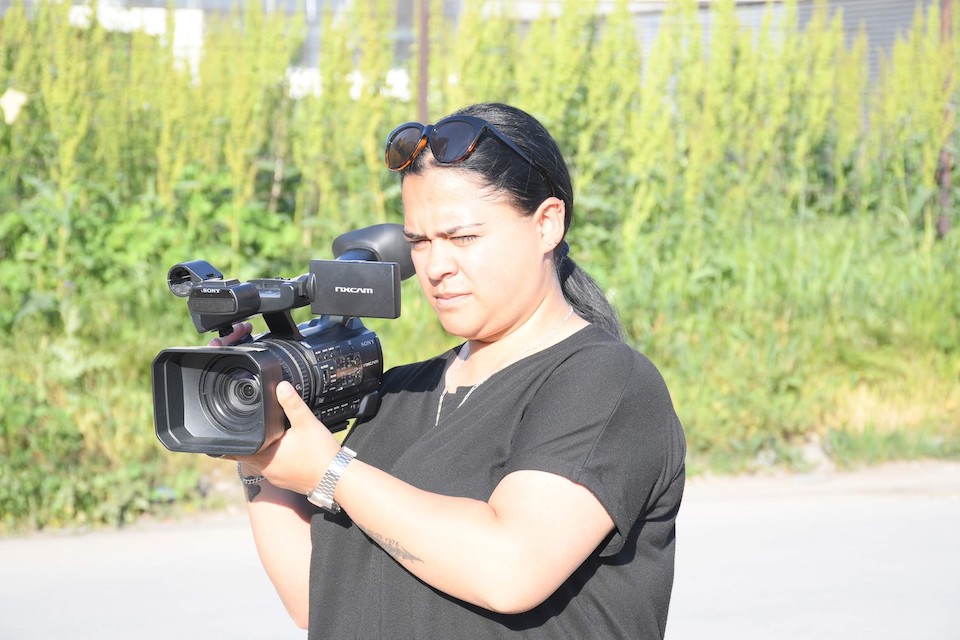A young videographer from Roma, Ashkali and Egyptian community in Kosovo gets the support needed to chase her dreams
Date:
Young women and girls from minority communities in Kosovo[1] are faced with double discrimination, based on their ethnicity and gender. The traditional culture and strict gender roles and segregation of the Roma, Ashkali and Egyptian community make it difficult for women from this minority group to achieve economic empowerment. In circumstances such as these, breaking barriers is especially hard. Nonetheless, Mergita Hoti, through UN Women’s support, has not only succeeded in securing her first high-level professional job, but she also become a young entrepreneur who is inspiring young women and girls from her community to work towards their dreams.

Mergita Hoti is a 24-year-old entrepreneur on a mission to empower young girls from her community to follow their dreams. She specializes in photography and videography and believes that her profession allows her to best express herself, share her perspective on everyday matters and become the voice of other people.
Growing up in a family that had offered their unconditional support to their children, Hoti knew what she wanted to do from an early age. As a child, she loved to accompany and help her father while he filmed and photographed during weddings. In time, she decided to turn her passion into a career. Being a woman photographer and filmmaker is difficult, especially when you come from a minority community, so Hoti knew she would have to work extra hard to achieve her goals.
Motivated by her desire to give back to the community and foster positive change, at the age of 15, Hoti began volunteering in different organizations that empower women and girls from the Roma, Ashkali and Egyptian community.
“I have been volunteering for nine years now, and my goal is to become a role model for the girls in my community, hoping to raise awareness of their potential to contribute to developing and improving the life of our community,” she says. “I am firm about continuing to learn, improving my skills as much as I can and going beyond my limits, leaving a legacy behind.”
Hoti’s unwavering determination has kept her going. She applied to different programmes to build her professional skills and capacities, and to learn how to run a business. On this regard, she is one of the beneficiaries of the project “Response to COVID-19 Emergency and Early Recovery Support” implemented by UN Women in cooperation with UNDP and funded by the European Union. It provides training and professional work equipment support to women from the most vulnerable groups in the municipalities of Gjakova and Peja. The project has already supported 25 women in the municipality of Gjakova and is continuing to support at least 20 in the municipality of Peja.
Through the trainings offered by UN Women’s implementing partner “Women Business Association SHE-ERA”, Hoti built her entrepreneurship, innovation and digital marketing skills, and also received support to purchase equipment. This helped her secure her first high-level professional assignment, as part of the recording team that organized and recorded an interview with the Mayor of the Municipality of Gjakova.. The Executive Director of SHE-ERA, Mirlinda Kusari Purrini, adds that Hoti is the first woman from the Roma, Ashkali and Egyptian community in Kosovo to start a business in the video production industry.
Recently, Hoti has also been giving back to her community by acting as a volunteer coordinator for the vaccination of children, making sure to reach even those living in hard-to-reach areas.
UN Women Head of Office , Vlora Tuzi-Nushi, says UN Women works for the economic empowerment of women and girls, especially those from vulnerable groups, through the COVID-19 response project: “Women’s economic empowerment sets a direct path towards making gender equality a lived reality. Special emphasis must be put on ensuring financial sustainability for women who are in vulnerable situations and ensuring their reintegration.”
Following the support received under the project, Hoti started her own video and photography production business and plans to continue further developing it.
“At the beginning I was very stressed, questioning everything and doubting if I am ever going to succeed, considering the circumstances. But, fortunately, I have a lot of people around who kept supporting and motivating me,” she says, citing support from her friends from the same community, who consider her a role model for the youth in her community.
Her words of advice to others: “Never give up on your dreams and always believe and depend solely on yourself. If you depend on others, you will not be able to succeed, because you are the creator of your own future.”
[1] All references to Kosovo should be understood to be in the context of United Nations Security Council resolution 1244 (1999).